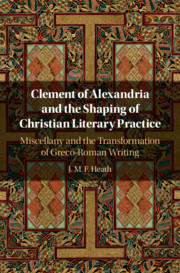 Clement of Alexandria and the Shaping of Christian Literary Practice
Clement of Alexandria and the Shaping of Christian Literary Practice Published online by Cambridge University Press: 16 December 2020
The conclusion draws together the threads of the argument to reflect on the relationship between Classical and Christian traditions. Earlier generations celebrated Clement as a missionary, liberal or humanist; this book has shown that he is rather a skilled literary artist who draws his readers closer to God by reinterpreting the Classical genre of the miscellany and relocating it within Christian tradition. Whereas Roman miscellanists often wrote in order to appropriate and transform Greek culture, Clement wrote to appropriate and transform pagan culture for Christianity. Among later Christians in antiquity, his project was read and admired from the desert to the library, and he was known as the Stromatist par excellence.
To save this book to your Kindle, first ensure no-reply@cambridge.org is added to your Approved Personal Document E-mail List under your Personal Document Settings on the Manage Your Content and Devices page of your Amazon account. Then enter the ‘name’ part of your Kindle email address below. Find out more about saving to your Kindle.
Note you can select to save to either the @free.kindle.com or @kindle.com variations. ‘@free.kindle.com’ emails are free but can only be saved to your device when it is connected to wi-fi. ‘@kindle.com’ emails can be delivered even when you are not connected to wi-fi, but note that service fees apply.
Find out more about the Kindle Personal Document Service.
To save content items to your account, please confirm that you agree to abide by our usage policies. If this is the first time you use this feature, you will be asked to authorise Cambridge Core to connect with your account. Find out more about saving content to Dropbox.
To save content items to your account, please confirm that you agree to abide by our usage policies. If this is the first time you use this feature, you will be asked to authorise Cambridge Core to connect with your account. Find out more about saving content to Google Drive.